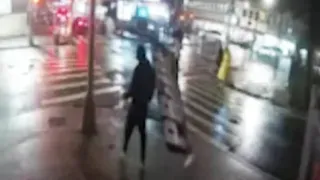July 29, 2013
LGBT Shelter Set for Hearing
Kilian Melloy READ TIME: 4 MIN.
A proposed LGBT-friendly homeless shelter in San Francisco is set to go before the city's planning commission for approval on permits, according to backers of the long-delayed project.
Wendy Phillips, executive director of Dolores Street Community Services, the nonprofit that would run the shelter, said permits related to the site are expected to be up for approval at the commission's August 15 meeting.
"Providing everything goes well with the permits," construction could start in September or October, said Phillips. The goal is to open the space by January.
Dolores Street already runs a shelter at the site, which is at 1050 South Van Ness Avenue and is planned as a mixed-gender, 24-bed space.
Work to establish the LGBT-friendly shelter began not long after a Board of Supervisors committee hearing that gay Supervisor David Campos held in March 2010 in which LGBTs testified about harassment in the city's shelters.
Since then, there have been several hurdles to establishing the proposed shelter.
At one point, Phillips and others learned that her agency's existing shelter didn't have the permit to operate as such. Other issues involved in expanding the site have included renovating bathrooms and installing partitions. The designated space is in a second floor section that's been used as a classroom.
Backers also struggled to raise $100,000 to cover rehabilitation costs. The pace picked up when Bevan Dufty, the gay director of the city's Housing Opportunity, Partnerships and Engagement program, stepped in. Among other contributions, the Haas Jr. Fund gave a $30,000 grant, and Phillips recently said a city community development block grant filled in the remaining fundraising gap.
As of February, Swinerton Builders had agreed to become the pro bono construction management partner to complete the renovations leading to opening the space and sent an estimator to work with a Dolores Street staffer, among other assistance. A call to the firm's San Francisco office Tuesday, July 23 went unanswered.
Phillips has estimated the city's Human Services Agency has added $150,000 a year for the operation of the LGBT shelter space "once it's up and running" to Dolores Street's existing shelter budget.
The planning commission will be reviewing Dolores Street's request for a conditional use permit to cover the existing shelter and reworking the site for the LGBT-welcoming space, and variances related to rear yard space and bike parking.
"We're asking to not have to meet those requirements because of the limited space we have at the site, and because we want to maximize sleeping areas," said Phillips.
It isn't known yet what recommendation planning department staff will offer of the requests.
"My assumption is they're going to recommend what we're asking for, but they're still in the process of preparing for the hearing," Phillips said.
Planning department spokeswoman Joanna Linsangan wasn't able to comment for this story because the project's lead planner wasn't available.
In a statement this week, Campos said, "An LGBT shelter in the city has been a long time coming. San Francisco has been a world leader in the LGBT movement but we have at times failed to protect the members of our community that are most vulnerable. After many years of hard work from community activists we are close to providing a safe space for LGBT folks in need."
Many Homeless LGBTs
Progress on the shelter comes in the wake of the Human Services Agency recently releasing data that show 29 percent of the city's homeless population identified themselves as LGBTQ in a January survey. Of the 6,436 homeless adults counted overall, about 47 percent were residing in shelters, residential treatment, or other facilities, while the rest were on the streets without shelter, according to the agency.
There are people who live on the streets, LGBT and otherwise, who don't want to stay at shelters, citing concerns about abuse, theft, and other fears, but Phillips said, "From our understanding, there is a tremendous need" for the LGBT space "just based on folks who already go to existing programs." She and others "don't anticipate a huge need to do outreach," she said.
River Sims, a gay independent Catholic priest and director of Temenos Catholic Worker, is familiar with the population. Several times a week, Sims reaches out to homeless people in the areas of Haight and Polk streets, as he's been doing for almost 19 years. He frequently gives out food, socks, condoms, and syringes. Socks are by far the most popular item - on a recent trip to the Haight, people practically chased him down for them.
"This is what I've always wanted to do," said Sims. "It's my calling." The people he encounters are those that, for the most part, nobody else wants to work with, he added. Sims's style of dress resembles many of the people he talks to in the street. He has a tattoo of the Virgin of Guadalupe on his left forearm and wears a studded leather wristband, along with a knit cap with a pot leaf patch, sandals, and a hoodie.
In the Haight, Sims talked to many young people who don't openly identify as LGBT - at least, not with a reporter around. But Sims, who's known many of the youth for years, indicated that several of them are at least bisexual. Many homeless youth also trade sex for money or a place to stay, so men may have sex with other men even if they don't identify as gay or bi.
On a recent visit to Polk Street, it was fairly easy to find LGBTs who are out.
Ed Gairaud, 45, who's gay, was pushing a shopping cart carrying clothes, blankets, and magazines when he encountered Sims this past Sunday.
"I could be housed, but I choose to be outside," said Gairaud. Asked about whether he'd stay at an LGBT shelter, he said, "I really don't like shelters."
He said maybe he would "if I could get case management there" to help him apply for benefits and make sure he makes it to medical appointments regularly. Gairaud said he has HIV and mental health issues.
Sam Sadowski, 19, who identifies as bi and transgender, was lying in the doorway of a Polk Street business. She said she would go to an LGBT-welcoming shelter.
"It seems like something that's more open for people like me than others," she said.
Kilian Melloy serves as EDGE Media Network's Associate Arts Editor and Staff Contributor. His professional memberships include the National Lesbian & Gay Journalists Association, the Boston Online Film Critics Association, The Gay and Lesbian Entertainment Critics Association, and the Boston Theater Critics Association's Elliot Norton Awards Committee.




